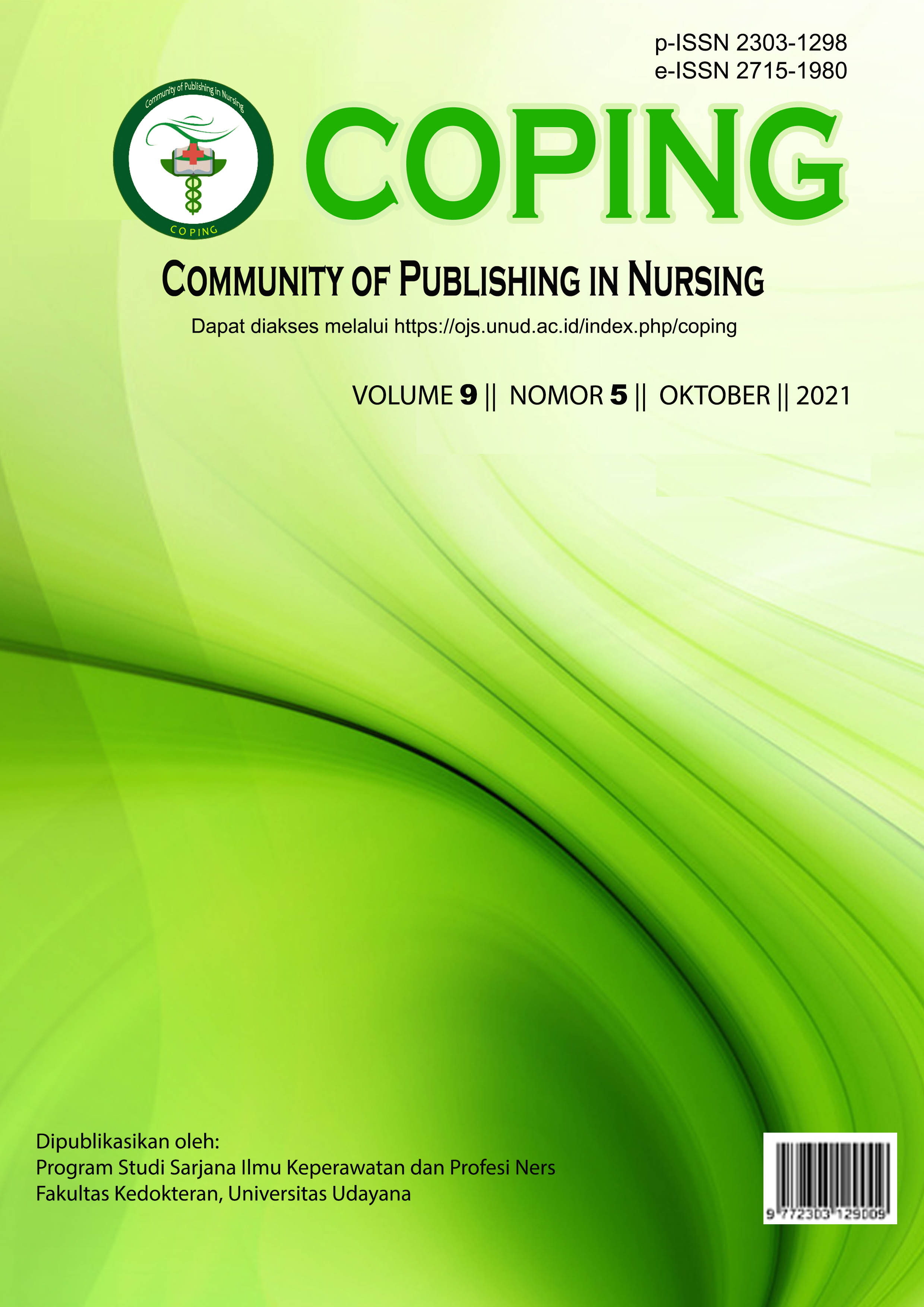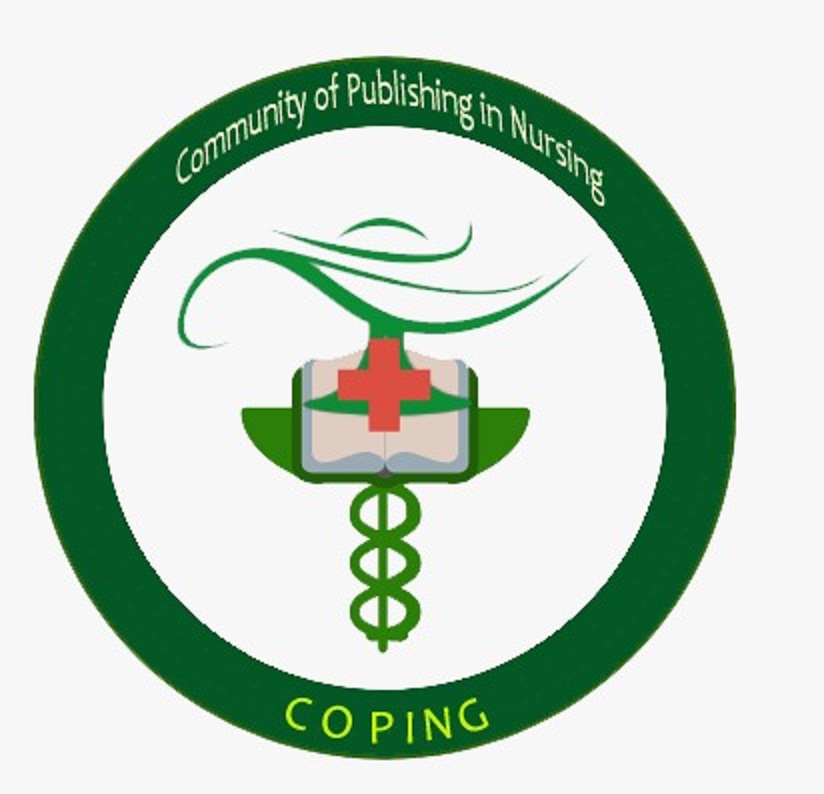HUBUNGAN PERILAKU PENGGUNAAN INTERNET TERHADAP INTERAKSI SOSIAL PADA MAHASISWA KEPERAWATAN DI KOTA DENPASAR
Abstract
Internet usage is a form of development of information and communication technology that changes a person's behavior in activities. The existence of the internet causes several impacts that are felt by many teenagers such as nursing students. The convenience provided when using the internet can cause nursing students to overuse the internet. Excessive use of the internet will affect the ability of nursing students in socially interaction. The research aims to understand behavior correlations internet use against social interaction on nursing students in Denpasar City. The design was used in the study of correlational descriptive research with the approach cross-sectional. The research sample was nursing students in Denpasar City who were obtained using probability sampling with proportional stratified random sampling technique (n=234). The independent variable of this research is internet usage behavior, while the dependent variable is social interaction with parents, social interaction with peers, social interaction with the campus environment, and social interaction with the community environment in nursing students. Data analysis used the Spearman correlation test (?<0.05). The results found that internet usage behavior is related to social interaction with peers (p=0.000), but not related to social interaction with parents (p=0.161), campus environment (p=0.540), and community environment (p=0.977). So it can be concluded that there is a correlation between internet usage behavior and social interaction with peers in nursing students in Denpasar City. Students are expected to reduce excessive internet use and increase social interaction with peers.
Downloads
References
APJII. (2017). Infografis penetrasi & perilaku pengguna internet Indonesia survey 2017. Diakses dari https://www.apjii.or.id/survei
Badan Pusat Statistik Provinsi Bali. (2020). Diakses dari https://bali.bps.go.id/statictable/2018/04/13/95/persentase-penduduk-usia-5-tahun-ke-atas-yang-mengakses-teknologi-informasi-dan-komunikasi-tik-dalam-3-bulan-terakhir-menurut-kabupaten-kota-2019.html pada 26 Desember 2020
Budiarto, G. (2020). Indonesia dalam Pusaran Globalisasi dan Pengaruhnya Terhadap Krisis Moral dan Karakter. Pamator Journal, 13(1), 50-56.
Cholik, C. A. (2017). Pemanfaatan Teknologi Informasi Dan Komunikasi Untuk Meningkatkan Pendidikan Di Indonesia. Syntax Literate; Jurnal Ilmiah Indonesia, 2(6), 21-30.
Dahlan, S. (2014). Statistik Untuk Kedokteran dan Kesehatan. 6 ed. Jakarta: Epidemiologi Indonesia.
Ginanjar, W. (2016). Hubungan Antara Intensitas Penggunaan Internet Dengan Perilaku Sosial Siswa Jurusan Multimedia SMK Saraswati Salatiga Tahun 2015 (Doctoral dissertation, Fakultas Tarbiyah dan Ilmu Keguruan).
Irmansyah, D., & Apriliawati, A. (2018). Hubungan Dukungan Orangtua dengan Resiliensi Remaja Dalam Menghadapi Perilaku Bullying di SMPN 156 Kramat Pulo Gundul Jakarta Pusat Tahun 2016. Indonesian Journal of Nursing Sciences and Practice, 1(1), 8-17.
Izzati, A. N. (2017). Hubungan Kecanduan Media Sosial Terhadap Tingkat Stres Pada Remaja di SMAN 2 Surabaya. Surabaya.
Kusumo, M. P. (2017). Pengaruh Komunikasi Terapeutik Perawat Terhadap Kepuasan Pasien di Rawat Jalan RSUD Jogja. Jurnal Medicoeticolegal dan Manajemen Rumah Sakit, 6(1), 72-81.
Lestari, F., A. (2014). Perbedaan Kemampuan Interaksi Antara Siswa Yang Mengikuti Organisasi Kesiswaan Di SMP Negeri 4 Kalasan Tahun Ajaran 2013/2014. Yogyakarta
Moslehpour, M. & Batjargal, U. (2013). Factors Influencing Internet Addiction among Adolencents of Malaysia and Mongolia. Jurnal Administrasi Bisnis. 9(2), hal. 5-20.
Muna, K. (2016). Pengaruh Interaksi Teman Sebaya Terhadap Perilaku Penggunaan Internet Pada Siswa Kelas XI di SMKN 2 Yogyakarta. Yogyakarta.
Nugroho, A. (2011). Hubungan antara Kesepian dan Kecenderungan Internet Addiction dengan Kemampuan Interaksi Sosial pada Remaja Pengguna Warung Internet y! Online.
Prasojo, R. A., Maharani, D. A., & Hasanuddin, M. O. (2018). Mengujikan Internet Addiction Test (IAT) ke Responden Indonesia.
Rachmawati, D. (2019). Hubungan Kecanduan Internet Terhadap Interaksi Sosial Remaja (Doctoral dissertation, Universitas Airlangga).
Raj, A. A., & Hakim, S. N. (2017). Perilaku Kecanduan Internet terhadap Interaksi Sosial pada Remaja di Lingkungan Kos (Doctoral dissertation, Universitas Muhammadiyah Surakarta).
Sa’adah, F. H. (2018). Pengaruh Intensitas Penggunaan Internet Terhadap Interaksi Sosial Pada Siswa MAN 3 Sleman. Skripsi
Salainty, F. R. (2015). Pengaruh Permainan Internet Terhadap Perilaku Remaja di Kelurahan Karombasan Utara, Journal Acta diurnal, IV(1)
Stockdale, L., & Coyne, S. M. (2018). Video game addiction in emerging adulthood: Cross-sectional evidence of pathology in video game addicts as compared to matched healthy controls. Journal of affective disorders, 225, 265-272.
Transyah, C. H., & Toni, J. (2018). Hubungan Penerapan Komunikasi Terapeutik Perawat Dengan Kepuasan Pasien. Jurnal Endurance: Kajian Ilmiah Problema Kesehatan, 3(1), 88-95.
Ulfiana, N. (2018). Hubungan Penggunaan Media Sosial dengan Kejadian Insomnia Pada Mahasiswa Jurusan Keperawatan (Doctoral dissertation, Universitas Islam Negeri Alauddin Makassar).
Utami, T. W., & Nurhayati, F. (2019). Kecanduan Internet Berhubungan Dengan Interaksi Sosial Remaja. Jurnal Keperawatan Jiwa, 7(1), 33-38.
Wahib, A. (2015). Konsep Orang Tua dalam Membangun Kepribadian Anak. Jurnal Paradigma,2(1).
Xu, J. et. al. (2014). Parents-adolescent interaction and risk of adolescent internet addiction : a population-based studi in Shanghai. BMC Psychiatry. 14.doi: 10.1186/1471-244X-14-112.







